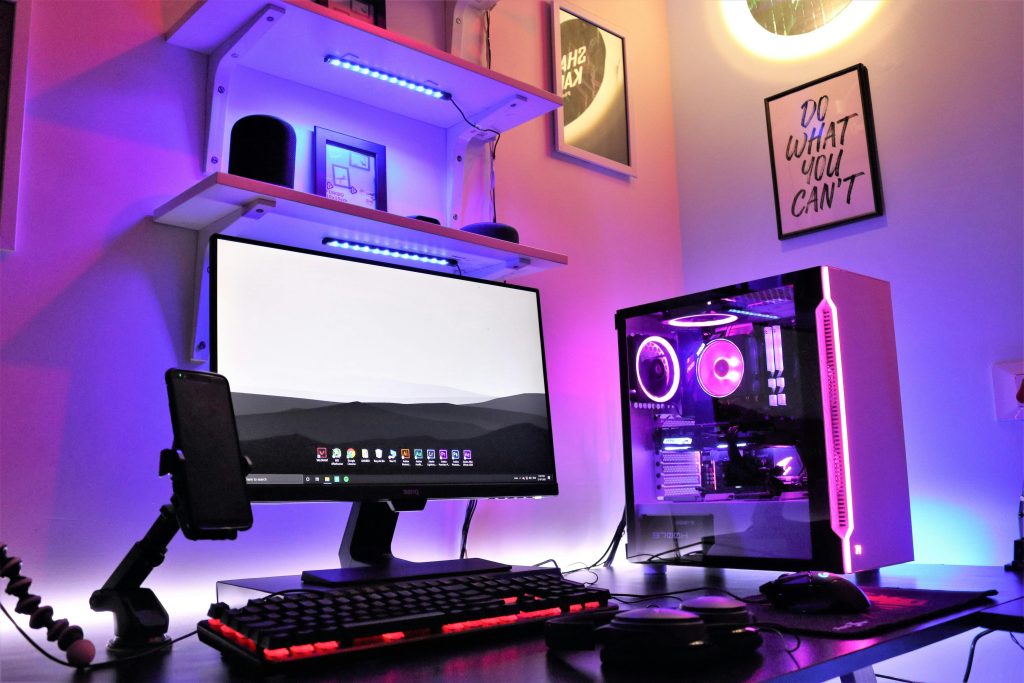When building a gaming PC, the casing (or case) is often the unsung hero. While the CPU, GPU, and memory are important for performance, the casing holds everything together, ensuring your components are protected, cool, and well-organized. With countless options available, selecting the right case can be overwhelming. In this post, we’ll explore the key aspects to consider when choosing a gaming PC casing to enhance your setup.
1. Size and Form Factor: Finding the Right Fit
The size of your gaming PC casing is one of the first decisions you’ll need to make. PC cases come in various sizes, and choosing the right one depends largely on the components you plan to use and the space available in your room or desk setup. The most common form factors include:
- Full Tower: Large cases that can accommodate multiple hard drives, long graphics cards, and powerful cooling systems. Perfect for gamers looking for a lot of room for upgrades.
- Mid Tower: The most popular size, offering a balance between space and compactness. It fits most components without taking up too much room.
- Mini Tower or Small Form Factor (SFF): Ideal for those with limited space or those who want a compact build. These cases are often smaller but may have restrictions on the number and size of components you can install.
Make sure the casing you choose can comfortably house your motherboard, graphics card, and any future upgrades you might want to add.
2. Airflow and Cooling: Keeping It Cool
Cooling is critical in any gaming PC, as high-performance components generate a lot of heat. Poor airflow can lead to overheating, which may reduce the performance of your components or cause them to fail prematurely. A good gaming PC casing will allow for proper airflow, keeping temperatures down even during intense usage.
Look for a casing with multiple fan mounts and enough space for large fans or liquid cooling solutions. Ideally, the case should support both intake and exhaust fans to create a flow of air that moves heat away from critical components. Additionally, some cases come with built-in fans, but you can always add more to meet your specific cooling needs.
3. Cable Management: Keeping It Tidy
A cluttered PC interior can negatively affect airflow and make it difficult to maintain your system. Good cable management is essential for creating a clean, organized build. Many modern gaming PC casings are designed with cable management in mind, featuring cut-outs, Velcro straps, and cable channels that help you neatly route wires.
Look for a casing with ample space behind the motherboard tray to hide cables and keep them out of sight. A well-organized case not only improves airflow but also makes maintenance and upgrades easier.
4. Build Quality and Durability: Long-Lasting Protection
The casing is the protective shell for all your valuable components, so it’s important to choose a case that offers durability. High-quality materials like steel, aluminum, and tempered glass are commonly used in gaming PC casings. Steel is strong and durable, while aluminum is lightweight and resistant to corrosion. Tempered glass panels are often used for aesthetics, allowing you to show off your components, but they should be thick enough to provide protection.
Consider the overall sturdiness of the case, especially if you plan to transport your PC. A solidly built casing will provide better protection for your internal components and ensure longevity.
5. Aesthetics and Design: Personalizing Your Build
While performance is paramount, the visual aspect of your gaming PC is also important for many gamers. A casing can significantly impact the overall look of your setup. Some cases feature sleek, minimalistic designs, while others offer bold, customizable elements like RGB lighting, transparent panels, or unique shapes.
If you want to showcase your build, consider cases with tempered glass side panels or transparent front panels. Many cases also feature RGB lighting options, allowing you to customize the look of your PC with different colors and effects to match your room or style.
6. Expansion and Upgrade Potential: Future-Proofing Your Build
As your gaming needs evolve, you may want to upgrade or expand your system. A good gaming PC casing should allow for future upgrades by providing enough space for additional components, such as extra storage drives, larger graphics cards, or more advanced cooling solutions.
Check if the case has sufficient room for extra hard drives, SSDs, or additional fans. Also, look at the motherboard support—some cases support both ATX and micro-ATX boards, giving you flexibility for future upgrades.
7. Noise Control: Minimizing Distractions
Gaming PCs can sometimes get noisy, especially when the fans are working hard to cool your components. Many gaming PC cases now include noise-dampening materials that help reduce the sound generated by your system. These materials are often applied to the sides, front, and top of the case to minimize vibrations and fan noise.
If you value a quiet environment, look for a case with sound-dampening features, such as insulated panels or rubber mounts for fans.
8. Budget: Finding the Right Balance
Gaming PC cases are available at a wide range of price points, from budget-friendly options to high-end, feature-rich models. While it can be tempting to splurge on a case with all the bells and whistles, it’s important to balance your budget with your needs.
You don’t need to spend a fortune to get a quality case. There are many affordable cases that offer good airflow, solid build quality, and sleek designs. Focus on what features matter most to you, whether it’s cooling, cable management, or aesthetics, and choose a case that offers the best value for your budget.
9. Conclusion: Making the Right Choice
Choosing the perfect gaming PC casing is more than just picking something that looks good—it’s about finding a case that provides the right balance of airflow, durability, expandability, and aesthetics. With the right case, you can create a gaming PC that not only performs well but also looks great in your setup.
By considering factors like size, cooling potential, cable management, and build quality, you’ll be well on your way to selecting a casing that suits your gaming needs. A well-chosen gaming PC case will protect your components, keep your system cool, and allow you to customize your setup to reflect your personal style. Happy building!

